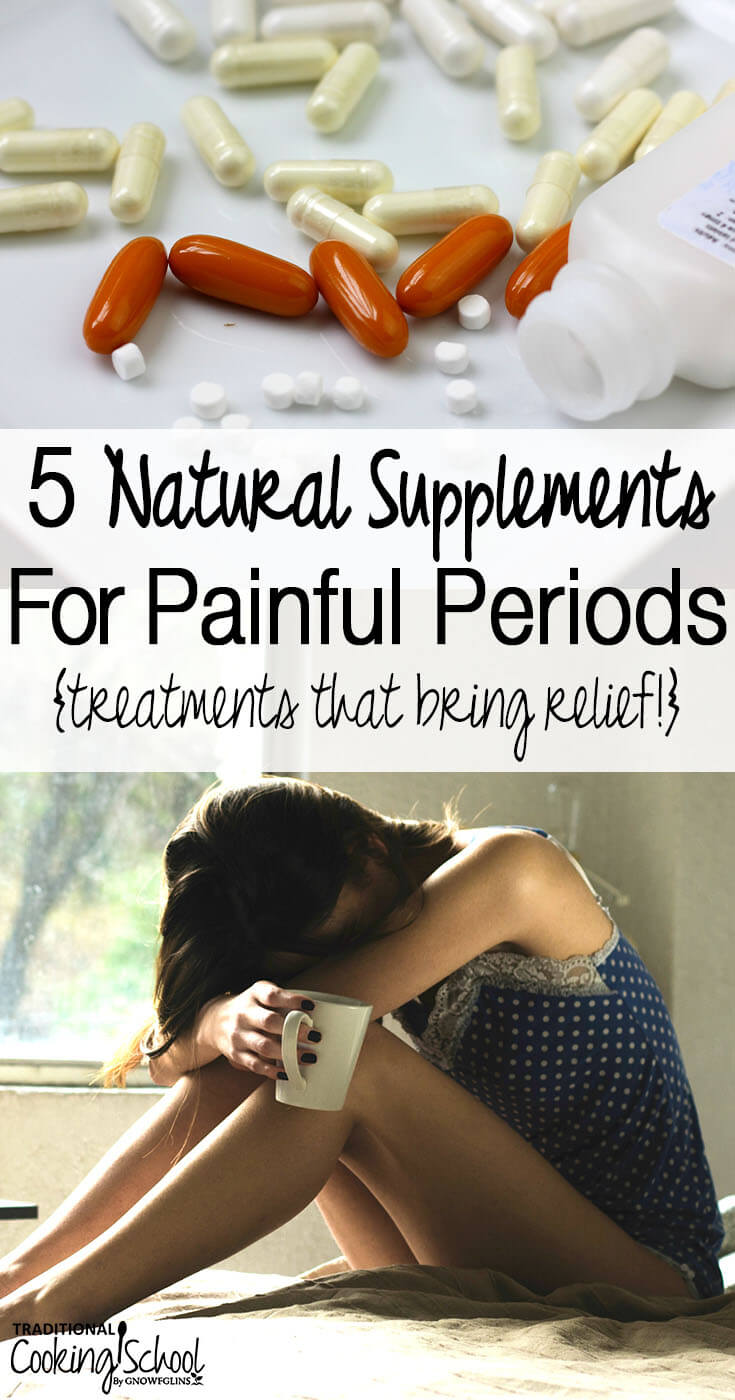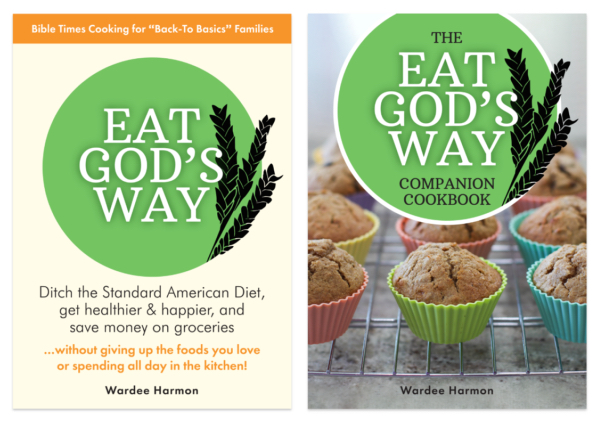
About 8 months ago, my 15-year-old daughter and I were searching for relief from painful periods.
We turned to a book — Period Repair Manual by Lara Briden, an Australian naturopathic physician (here it is).
Within an afternoon, we read it, side by side as we both leaned in towards the book, making comments as we went. I wasn’t afraid to dog-ear pages or highlight certain sections — she has many pearls of knowledge and wisdom! When we finished, I opened my computer to order supplements right away.
Do you understand the cause of menstrual pain? Do you know how to correlate your PMS symptoms with nutritional deficiencies? If not, I highly recommend Lara Briden’s book, as she uncovers many subtleties this short article cannot about YOU and YOUR body.
5 Natural Supplements For Painful Periods {treatments that bring relief!}
Once we read the book and ordered our supplements, it took only one month for my daughter and I to feel better! Perhaps you can too. Here are some of my favorite supplements from Lara Briden’s book. I also share one I learned from my local doctor.
#1 — Magnesium
“Magnesium is your number one supplement for period pain.” –Lara Briden, Period Repair Manual, 2nd edition, page 263
Quick break from our list, okay? I need to interject a word that is new for many of us and that will help us to better understand the “why” of our pain. The word is prostaglandins.
Prostaglandins are fatty acid compounds found in cells throughout the body. They play a role in causing inflammation and uterine contractions. Depending on the type of receptor to which prostaglandins bind, they stimulate either a negative or a positive effect in the body. They regulate hormones and inflammation, induce labor, affect digestion and stomach health through acid and mucous production, and play a major role in painful periods.
Prostaglandins are released during menstruation when the epithelial layer of the uterus sheds. Because prostaglandins cause the uterus to contract during labor, their release during menstruation causes a similar sensation and pain! (Source and source.)
Magnesium works to prevent period pain by reducing prostaglandins. Taking additional magnesium during acute period pain is also effective. (Source.) Lara recommends 300 mg magnesium glycinate taken 1 to 2 times daily. (Find magnesium here.)
#2 — Virgin Cod Liver Oil
Although Lara mentions fish oil, I’m going to take her recommendation a step further by zeroing in on the best kind of fish oil: virgin cod liver oil. It’s hard to discuss any health issue without mentioning virgin cod liver oil (source). We use it in our home to prevent illness, to improve dental health, and yes, to balance hormones.
Virgin cod liver oil provides omega-3 fatty acids which “are precursors to the series 3 prostaglandins (which balance and outcompete inflammatory prostaglandins)” (Period Repair Manual, 1st edition, page 206).
The adult dosage for virgin cod liver oil is 1/2 to 1 teaspoon daily (find it here). Personally I take 3 gelatin capsules daily instead, because I strongly dislike the taste.
#3 — Curcumin
Lara recommends turmeric in her book as a supplement for period pain, yet again I will be a little bit more specific. Curcumin is the anti-inflammatory compound in turmeric which makes it so helpful for reducing prostaglandins. (Learn more about curcumin here!)
Like cod liver oil, curcumin must be taken every day of the month to prevent painful periods, yet can also be taken for acute pain, like magnesium.
My family uses this brand. Dosage is one capsule daily.
#4 — Zinc
Zinc, too, is anti-inflammatory! It also supports the thyroid, making it a great choice for general hormone-balancing. Zinc encourages blood circulation within the uterus. We take 30 mg of this brand daily, with breakfast. Never take zinc on an empty stomach or it can make you feel sick.
#5 — Magnesia Phosphorica Homeopathic
My naturopathic doctor suggested the Magnesia Phosphorica homeopathic for me when my cramps worsened during perimenopause. Although the above supplements have reduced and improved my and my daughter’s symptoms considerably, I still carry Mag Phos around with me in my purse, and my daughter always has some in her backpack. I don’t like to be without it, just in case…
The pellets work for terrible acute pain, especially when used immediately at the initial onset of cramps. They can be used repeatedly to reduce pain during acute period pain. They’re both effective and affordable. Mag Phos is especially recommended for those who find themselves curled up in pain and who may find some small relief from a heating pad or hot bath.
Take 3 pellets, under the tongue, and allow to dissolve whenever pain begins.
In my mind, these are the 5 most important supplements to use as your first line of healing and balancing for period pain. However, there are others we use daily that are also worth considering! Read Lara’s book to learn more about alpha-lipoic acid, N-acetyl cysteine (NAC), iodine, and several others that may meet your individual needs.
What about foods? Which foods are estrogenic and making your period pain worse? Read this post: Period Pain Foods: What to Eat and What Not to Eat to Reduce Menstrual Cramps, to learn how your diet affects your monthly cycles and what you can do about it.
Check out these resources for more information on female health!
- Women’s Health eCourse — featuring several interviews with Lara Briden on PCOS, endometriosis, the phases of menopause, and more!
- 6 Ways to Take Care of Yourself During Your Period
- 10 Essential Oils To Use During Every Phase Of Your Cycle
- Understanding The Female Cycle & How Seeds Can Restore Hormone Balance (even in menopause!)
More Informational Articles on Supplements:
- Should You Take A Multi-Vitamin Or Individual Vitamins? #AskWardee 092
- Do You Have A Vitamin B12 Deficiency? {symptoms & a simple solution}
- 7 Natural Ways To Boost Your Immune System +Home Remedies For Cold & Flu #AskWardee 139
- Best Food Sources Of Protein, Vitamins, And Minerals For Vegans And Vegetarians #AskWardee 142
- 5 Supplements To Consider Taking This Year
What natural remedies have you found to be the most helpful for period pain?
...without giving up the foods you love or spending all day in the kitchen!

2 free books:
Eat God's Way
Ditch the Standard American Diet, get healthier & happier, and save money on groceries...
We only recommend products and services we wholeheartedly endorse. This post may contain special links through which we earn a small commission if you make a purchase (though your price is the same).


During the day I use magnesium and curcumin extract and sometimes raspberry leaf tea. However, I still find I have to supplement with an ibuprofen for the first 2 days. I used to take 2 or 3 ibuprofen on a regular schedule throughout the day so my new routine is a big improvement for me! At night I take crampbark root extract. I’d take it during the day but it makes me sleepy. I’ve read that ginger supplements can help also but I haven’t had success yet with them; either they don’t work for my body or I haven’t gotten the right dose yet. I’m looking for some alternatives so I can get rid of the ibuprofen all together so I appreciated this article!
The weird thing is, when I’m eating super healthy (e.g. when I’m doing a Whole30 type of diet) my cramps seem to be worse that month but then they get better when I re-incorporate grains (mostly non-wheat and non-corn as I’m sensitive), dairy (only a small amount and mostly goat), and some sweet foods. I eat very little processed food whether doing a cleansing diet or not. Wardee, do you have any theories on why this happens? I’ve had PCOS since my early 20s (I’m now 49) but no diabetes or hypothyroid (yes, I’ve had all of the tests including the antigen test). I started having regular periods monthly about 10-12 years ago after making a lot of tweaks to my diet over time starting from the time of my diagnosis.
Thanks so much for your thoughts!
Hi Leslie, I highly recommend that you consider the homeopathic recommended in this article, instead of ibuprofen. You can read again about it above. It is used in the same way as ibuprofen; it’s the most effective when the pain first begins. It can be used repeatedly, if and when pain returns or persists. Also, if you find yourself using ibuprofen, there’s a supplement called n acetyl l cysteine (or NAC) that helps to protect your stomach lining and liver (from the damaging effects of ibuprofin), which would be good, too, to consider.
Regarding your diet, no one diet fits everyone for wellness and hormone balance. If you notice that your symptoms are worse doing a diet like Whole30, it may be best to observe which foods exactly cause issues. This post (http://eatbeautiful.net/2018/02/21/period-pain-foods-what-eat-and-not-eat-reduce-menstrual-cramps/) discusses foods that makes cramps worse.
See if you can find the right balance of foods and supplements that leave your body symptom-free. The non-wheat grains and goat dairy you mention certainly are not foods that would make cramps worse necessarily. Those are healthful foods for most people, so a great choice, it sounds like, for you. There may be something else about the Whole30 diet that isn’t beneficial for you. It sounds like your regular diet serves you well, but it may need a bit of tweaking and the addition of a supplement or two to alleviate the symptoms.
I hope you’ll consider Lara’s book, as it addresses several other supplements that could be very helpful. I’d firstly consider all 5 mentioned in this post, and then enjoy her book to see what else addresses you personally.
Megan, thank you so much for your reply! I’ve added the phosmag and the book to my Amazon wishlist! I may try the curcumin you recommend but so far I’ve have great results from Gaia’s Turmeric Supreme Extra Strength (I try not to promote brands but was taken back by how well my body responds to this one so I go ahead and mention it when the subject comes up). I’ll consider getting the extra virgin cod liver oil as well; I really should be taking a good fish oil as my family is prone to heart disease.
I learned with my doctor in Brasil, about 30 years ago to avoid coffe, black tea and chocolate 10 days before your period start, it is funny because it is when I craved more, since I learn that, never had pain
Those are great suggestions. I love that your doctor was able to pass along such helpful wisdom!
I looked at the mag phos on Amazon and it gives 2 choices, 6x and 30x. How do I know which one to choose?
Hi Dawn, the 6x is the one you want, for localized pain (in specific areas).